Quality of wheat-cassava bread as affected by selected improvers, Dr. Michael Idowu, Kazeem Iroko, Dr. Abiodun Adeola, Dr. Isaac Oluwalana, Dr. Jerome Ayo and Damilola Ikuomola
 Dr. Michael Ayodele Idowu, Kazeem Iroko
Dr. Michael Ayodele Idowu, Kazeem Iroko
Department of Food Science and Technology
Federal University of Agriculture, Abeokuta
Nigeria
Email: idowumchl@yahoo.com
Dr. Abiodun Aderoju Adeola
Institute of Food Security, Environmental Resources and Agricultural Research, Food and Nutrition Research Programme
Federal University of Agriculture, Abeokuta
Nigeria
Dr. Isaac Babatunde Oluwalana
Department of Food Science and Technology
Federal University of Technology, Akure
Nigeria
Dr. Jerome Ayokunle Ayo
Department of Food Technology
The Federal Polytechnic, Bauchi
Nigeria
Damilola Shayo Ikuomola
Department of Food Science and Technology
Joseph Ayo Babalola University, Ikeji-Arakeji
Nigeria
DOI: 10.1108/WJSTSD-08-2014-0025
Purpose: The purpose of this paper is to evaluate some common bread improvers (normally used for 100 per cent wheat bread) for their effect on the quality attributes of wheat-cassava (90:10) composite bread.
Design/methodology/approach: Four commonly used bread improvers (ASA, ABT, EDC and PTB) in Nigeria were evaluated for their effect on the baking potential of wheat-cassava (90:10) composite flour. Bread samples were baked from wheat-cassava (90:10) composite flour, with and without bread improvers. Changes in dough height during fermentation, oven spring, yield and specific volume of bread samples were determined. Bread samples were also evaluated for their sensory and staling characteristics.
Findings: Results showed that dough height during fermentation did not change significantly (p<0.05) and crumb colour, firmness, taste and aroma were unaffected by addition of bread improvers; but oven spring, yield, specific volume, bread shape, crust colour, texture and overall acceptability of bread were significantly different (p>0.05). All the bread improvers except ABT extended the shelf life of wheat-cassava (90:10) composite bread for a period of 24-48 hours.
Practical implications: Bread improvers normally used for 100 per cent wheat bread could be used effectively for wheat-cassava (90:10) composite bread without an adverse effect on quality of bread.
Originality/value: Bread makers need little or no additional training to handle wheat-cassava (90:10) composite flour for bread making process hence, Nigeria can sustain her policy of using wheat-cassava composite flour for baking without any serious technical problem.
Keywords: Sustainabilit; R&D; Technology; Baking; Composite flour; Bread improvers; Quality attributes; Wheat; Cassava; Additives.
Citation: Idowu, M.A., Iroko, K., Adeola, A.A., Oluwalana, I.B., Ayo, J.A. and Ikuomola, D.S. (2015), "Quality of wheat-cassava bread as affected by selected improvers", World Journal of Science, Technology and Sustainable Development, Vol. 12 No. 1, pp. 79-86. https://doi.org/10.1108/WJSTSD-08-2014-0025

